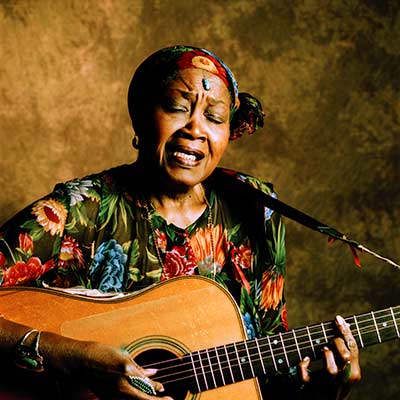
Folk is important because it inspired change during the Civil Rights Movement and united Americans of all races under one cause.
Folk music incorporates instruments such as the banjo, the djembe, and elements of the patting juba to create music. When you google pictures of banjo players you only see white banjo players. It takes a bit of scrolling to find black banjo players. In fact, the history of the banjo is very whitewashed. However, the best banjo players who laid the foundation of banjo playing as we know it were Black enslaved people. Folk music has influenced various musical genres like the blues and even hip-hop.
Folk music stems from the negro spirituals. Following the lead of negro spirituals, folk music was recorded orally and never written down. The earliest Black folk musicians were enslaved Black people and their descendants. Folk music has been around for many pivotal moments in African-American history. It was even popular during the Civil Rights Movement. Much of folk music reflected the lives of poor Black singers and their everyday experiences. The earliest folk songs were sung by enslaved people, which included callouts and chants. This is also known as a call and response. Throughout the day you would hear folk songs on the plantation. It was an efficient way to measure time and also to spread secret messages.
Odetta is considered the “Queen of Folk Music.” In 1963 she released her album “Odetta Sings Folk Songs,” which is one of the best selling folk music albums. Odetta was popular because her voice was so powerful and beautiful. During the Civil Rights Movement, Odetta stood beside Dr. King at the March on Selma and other folk musicians like Sweet Honey in the Rock. Odetta also performed at the March on Washington in 1963. Odetta was nominated for three Grammy and won numerous, well-deserved awards. Some of her most famous songs are “Hit or Miss,” “This Little Light of Mine,” “Glory, Glory” and “Oh Freedom.”
Folk music honors the past by incorporating elements from Negro Spirituals and reimagines a future that’s better than the present. Folk music is truly innovative as it predicted the outcome of the Civil Rights Movement, which led Black people to freedom.
Works Cited
Evans, Bill. “Remembering the Queen of Folk Music: New Biography Spotlights Singer, Guitarist, Actor, and Activist Odetta.” Acoustic Guitar, 26 Aug. 2020, acousticguitar.com/remembering-the-queen-of-folk-music-new-biography-spotlights-singer-guitarist-actor-and-activist-odetta/.
Fancher, Lou. “A New Biography of Odetta Reveals a Difficult Life Well Sung.” San Francisco Classical Voice, 2020, www.sfcv.org/reviews/none/a-new-biography-of-odetta-reveals-a-difficult-life-well-sung.
Kreps, Daniel. “Folk Singer And Civil Rights Activist Odetta Dead At 77.” Rolling Stone, Rolling Stone, 25 June 2018, www.rollingstone.com/music/music-news/folk-singer-and-civil-rights-activist-odetta-dead-at-77-99701/.
“Roots of African American Music.” Smithsonian Music, music.si.edu/spotlight/african-american-music/roots-of-african-american-music.
Ruehl, Kim. “The History of African-American Folk Music.” LiveAbout, www.liveabout.com/history-of-african-american-folk-music-1322654.
“We All Owe a Debt to Odetta: 15 Facts About the Legendary Folk Musician and Activist.” Beacon Broadside: A Project of Beacon Press, 22 Apr. 2020, www.beaconbroadside.com/broadside/2020/04/we-all-owe-a-debt-to-odetta-15-facts-about-the-legendary-folk-musician-and-activist.html.

Login to your account